教学设计 Unit11 teaching plan
新教材高一英语UNIT11教案

新教材高一英语UNIT11教案Teaching plan forUnit 11The Sounds of the worldTeaching goals:1. Learn to enjoy different kinds of music2. Be able to give opinions on music3. Be able to retell the reading4. Grasp the uses of some important points5. Get the ability of using the passive voice freely6. Write a short passage about musicProcedure:Period 1:Warming up; Listening; Speaking.Period 2: Listening in the workbook; pre-reading; reading comprehension and post reading.Period 3: Deal with the important points in the parts above.Period 4: Language study and the grammar.Period 5: Integrating skills in the students book and integrating skills in the workbook.Period 6: Deal with the practices in the workbook.Period 7: A small test for Unit 11.Period OneI. Warming up:1. Brain storming questions:1). What sound do you like best?2). What sound do you like least?3). What music do you like best?4). Who is your favorite singer?5). What instrument can you play?If you are asked to choose, what instrument do you choose to play?6). Do the practice in the text book.II. ListeningIII. SpeakingIV. Homework: Read and remember the new words and expressionsPeriod TwoI. Pre-readingII. Play the tape and then ask the students to read the text for a while. After that the students should be able to answer some simple questions without looking at the book.1. The music we hear on the radios or see on TV is all that exists in the world, isn’t it?2. What kind of music is the blues?3. Where does it come from? Why does it become an important part of American culture?4. What other musical styles come from blues music?5. What is the most important characteristic of rap music?6. What does the singer in rap music do?7. Where is Latin music from?8. Among whom is it popular?9.How famous are stars like Santana and Ricky Martin?10. What’s the writer’s advice on buying a tape or a CD?Ⅲ. Do the exercises in the post-reading.Ⅲ. Retell the reading, introducing the musical styles in your own words.Ⅲ. Homework: Try to recite several parts of the reading.Period threeⅢ. Check the homeworkⅢ. Study the use of the words:1. turn n. duty, chance or right to do sth.①It’s one’s turn to do sth②take turns③by turns④in turne.g. 1). Whose turn is it to clean the room?2). The three brothers took turns at looking after their sick mother.3) .He asked each of us in turn what we had been doing.2. in mind①Remember several phrases about “mind”②bear / keep in mind remember③make up one’s mind be determined④keep one’s mind on put one’s heart into.⑤change one’s mind⑥be in two minds hesitate3. dance to done at the same time as music is being played.e.g. 1). He sang to his guitar.2). The poem has been set to music.[1][2]下一页。
(高一英语教案)新教材高一教案UNIT11(第3课时)-教学教案

新教材高一教案UNIT11〔第3课时〕-教学教案(Pre-reading \Reading\Post-reading)Step 1 Pre-reading1. Checking homework1) T asks the question: Do you play any musical instrument What is your favourite instrument In this way, Ss review names of kinds of musical instrument.1) T asks another question: Has anybody got any information about musical styles Ss tell different kinds of music, such asblues\hip-hop\rap\Latin music etc.Here is some information about music:Music is a language that is spoken to everyone—from the day we are born we hear music of some kind of our lives. But there are as many different kinds of music as different languages, and it is impossible to describe them all. Here are just a few well-known types.Classical music is serious Western European music from the Middle Ages(1500) to the present and it was often written for a large orchestra,or for a small group of players. Many instruments can be used. A lot of music was also written to be sung as opera. Classical music is very popular and schools often teach this type of music.Jazz developed in the Southern States of North America at the beginning of last century. The black people of these states, who were originally slaves from Africa, had their own rhythms. Jazz brought classical music and African rhythms together.Blues was originally Black Country music, which also came from the Southern States of last century. It is slow, usually sad music, which is often sung by one person with a guitar.Rhythm and blues developed from the Blues in America in the 1940s. It became faster and more complex and used more instruments, e.g. saxophone, guitar, piano, drums. The music was often about city life and white musicians started playing it as well.Musicians in the 1950s developed Rock from Rhythm and Blues and it became popular with young people. It spread to Europe in the 1960s and is now known in most countries. A lot of pop music comes from Rock and Roll.Pop music developed from Rock and Roll in America, Britain and Europe in the 1960s and is now in every country. The name is used for most commercial music, i.e. music we can buy on records and hear on “pop radio〞. It is usually played by groups who often use electricinstruments and make videos to go with their records.2. Pair-workHave Ss discuss these questions in pairs.1) What kind of music do you like2) When you listen to a song, do you listen to words or the music2) Do you like to listen to music form other countries3. A gamePlay some music played by different musical instruments, ask the Ss to guess what makes the song. (piano/guitar/trumpet/drum)Teach the English names of different musical instruments on the slide: violin, trumpet, guitar, jazz drum, mouth-organ, huqin(Chinese violin) etc.Step 2 Reading1. Fasting readingHave Ss read the passage as quickly as possible to find the answer to the question: How many kinds of music are mentioned in the passage and what are they2. Careful readingHave Ss read the passage carefully and fill in the form below according to the passage.。
新教材高一英语UNIT11教案(篇二)
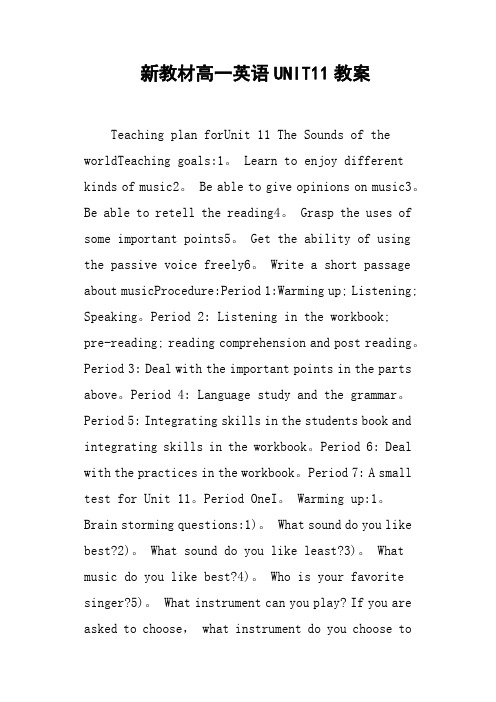
新教材高一英语UNIT11教案Teaching plan forUnit 11 The Sounds of the worldTeaching goals:1。
Learn to enjoy different kinds of music2。
Be able to give opinions on music3。
Be able to retell the reading4。
Grasp the uses of some important points5。
Get the ability of using the passive voice freely6。
Write a short passage about musicProcedure:Period 1:Warming up; Listening; Speaking。
Period 2: Listening in the workbook;pre-reading; reading comprehension and post reading。
Period 3: Deal with the important points in the parts above。
Period 4: Language study and the grammar。
Period 5: Integrating skills in the students book and integrating skills in the workbook。
Period 6: Deal with the practices in the workbook。
Period 7: A small test for Unit 11。
Period OneI。
Warming up:1。
Brain storming questions:1)。
What sound do you like best?2)。
unit11教学设计(合集5篇)
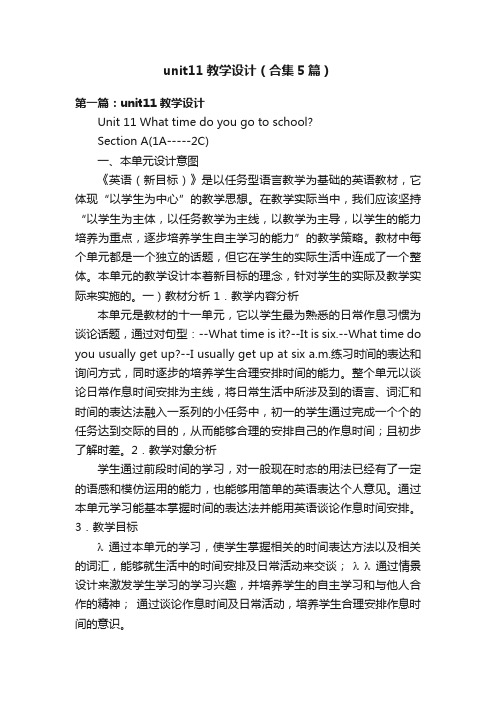
unit11教学设计(合集5篇)第一篇:unit11 教学设计Unit 11 What time do you go to school?Section A(1A-----2C)一、本单元设计意图《英语(新目标)》是以任务型语言教学为基础的英语教材,它体现“以学生为中心”的教学思想。
在教学实际当中,我们应该坚持“以学生为主体,以任务教学为主线,以教学为主导,以学生的能力培养为重点,逐步培养学生自主学习的能力”的教学策略。
教材中每个单元都是一个独立的话题,但它在学生的实际生活中连成了一个整体。
本单元的教学设计本着新目标的理念,针对学生的实际及教学实际来实施的。
一)教材分析 1.教学内容分析本单元是教材的十一单元,它以学生最为熟悉的日常作息习惯为谈论话题,通过对句型:--What time is it?--It is six.--What time do you usually get up?--I usually get up at six a.m.练习时间的表达和询问方式,同时逐步的培养学生合理安排时间的能力。
整个单元以谈论日常作息时间安排为主线,将日常生活中所涉及到的语言、词汇和时间的表达法融入一系列的小任务中,初一的学生通过完成一个个的任务达到交际的目的,从而能够合理的安排自己的作息时间;且初步了解时差。
2.教学对象分析学生通过前段时间的学习,对一般现在时态的用法已经有了一定的语感和模仿运用的能力,也能够用简单的英语表达个人意见。
通过本单元学习能基本掌握时间的表达法并能用英语谈论作息时间安排。
3.教学目标λ通过本单元的学习,使学生掌握相关的时间表达方法以及相关的词汇,能够就生活中的时间安排及日常活动来交谈;λλ通过情景设计来激发学生学习的学习兴趣,并培养学生的自主学习和与他人合作的精神;通过谈论作息时间及日常活动,培养学生合理安排作息时间的意识。
4.教学难点λ时间的表达法5:15 five-fifteen(a quarter past five)11:50 eleven-fifty(ten to eleven)6:30 six thirty(half past six)λ第三人称单数谓语动词的运用λ本单元的新词汇多及内容跨度大也给学生在理解和掌握上带来了一定的困难。
Unit 11 My Wood Teaching Plan 教案
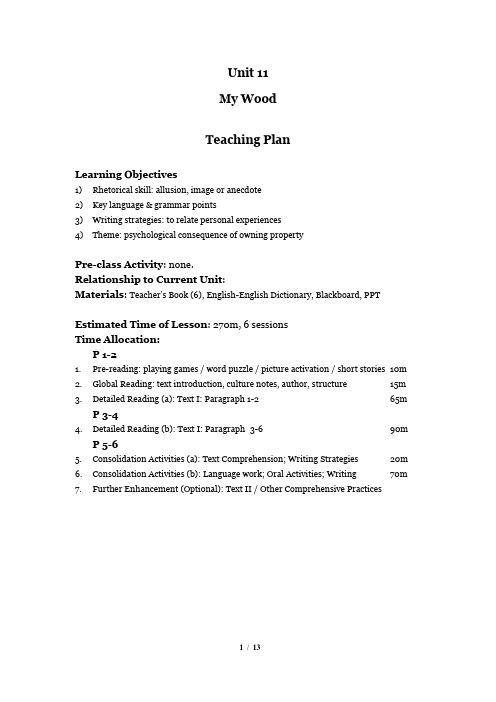
Unit 11My WoodTeaching PlanLearning Objectives1)Rhetorical skill: allusion, image or anecdote2)Key language & grammar points3)Writing strategies: to relate personal experiences4)Theme: psychological consequence of owning propertyPre-class Activity: none.Relationship to Current Unit:Materials: Teacher’s Book (6), English-English Dictionary, Blackboard, PPTEstimated Time of Lesson: 270m, 6 sessionsTime Allocation:P 1-21.Pre-reading: playing games / word puzzle / picture activation / short stories 10m2.Global Reading: text introduction, culture notes, author, structure 15m3.Detailed Reading (a): Text I: Paragraph 1-2 65mP 3-44.Detailed Reading (b): Text I: Paragraph 3-6 90mP 5-65.Consolidation Activities (a): Text Comprehension; Writing Strategies 20m6.Consolidation Activities (b): Language work; Oral Activities; Writing 70m7.Further Enhancement (Optional): Text II / Other Comprehensive PracticesSection One Pre-reading ActivitiesI. Picture ActivationWhat is your opinion of property?II. Pre- reading Questions1. It is said that man is selfish by nature, so he wants to own many things. Material comfort is regarded as a guarantee of quality life. Which do you think can give you more satisfaction, owning or sharing? Why?Open for discussion.2. A free lunch is something that almost everyone longs for. That’s also why lotteries are so popular nowadays. Suppose you won a lottery of 20 million RMB. How would you spend the money?Open for discussion.Section Two Global ReadingI. Text IntroductionIn this essay, the author explores the psychological consequences of owning property. Through a fine description of the psychological changes he underwent after he had bought a wood, the author suggest s that it is perhaps part of human nature to be “stout,” “avaricious,” “pseudo-creative” and “selfish” and that property is a curse that intensifies all these negative elements of man.II. Culture Notesthe Jordan (Paragraph 2)a river that flows from Syria through the Sea of Galilee into the Dead SeaAhab (Paragraph 4)Ahab was the king of Israel from ca. 875 B.C. to ca. 853 B.C. He did evil in the sight of God, principally by marrying Jezebel, a wicked woman, and by building places of worship to her god, Baal. Ahab permitted Jezebel to obtain for him a vineyard he wished to have, by causing its owner, Naboth, to be falsely accused of cursing God and the king, and then stoned to death.Union Jack (Paragraph 4)the national flag of the United KingdomDante (Paragraph 5)Alighieri Dante (1265–1321), Italian poet. His best-known work is Divine Comedy (1300–1321), which describes Hell as a funnel of descending cities where sinners are punished, Purgatory as a mountain of repentant sinners in circles ascending to Paradise, which contains his beloved BeatriceIII. AuthorE. M. Forster (1879–1970), full name Edward Morgan Forster, an English writer, novelist. His novels include A Room with a View (1908) and A Passage to India (1924).IV. Structural AnalysisPart 1(Para. 1) raising the topic of the essayPart 2(Paras. 2-5) discussing on the psychological consequences of owning propertyPart 3(Paras. 6-7) discussing the selfishness of the owner and the concluding remarks Section Three Detailed ReadingMY WOODE.M. ForsterI. AnalysisParagraph 1 AnalysisIn the first paragraph the author raises a question: “What is the effect of property upon the character?” Then he limits the topic of the essay to the psychological aspects of the quest ion: “Don’t let’s touch economics ...,” “Let’s keep to psychology.”Paragraph 2 AnalysisThe author discusses the first effect of property on him (“... it makes me feel heavy.”) and this is reiterated at the end of the paragraph (“My wood makes me feel heavy.”). This heaviness is first depicted with a parable cited from the New Testament about “a man of weight”.Thus the reader is presented with the image of a “heavy” man who “failed to get into the Kingdom of Heaven.” Obviously the author is suggesting t hat a man of property is a heavy man.Paragraphs 3-4 AnalysisThese two paragraphs discuss the second psychological consequence of owning property —intensified avarice. Once you possess something, you will regard it as “mine”: even a bird that flies inci dentally into your wood is “mine” and you will try to keep it from flying away.Paragraph 5 AnalysisThis paragraph elaborates on the third psychological effect produced by property —pseudo-creativity. The author ironically explains it as the owner’s va gue desire to express his personality.Paragraphs 6-7 AnalysisOn the surface “the blackberries” stands for anything that is within the boundary of one’s property. The author uses it here as a symbol of the intense selfishness of the owner due to his haunting desire and painstaking efforts to keep everything to himself.At the end of the essay the author summarizes the four effects of owning property as “enormously stout, endlessly avaricious, pseudo-creative, intensely selfish.”II. Questions for ParagraphsParagraph 1: QuestionDoes the author mention his book merely to indicate that he could afford to buy the wood with a cheque?This is only one reason. Another appears to be to poke gentle fun at Americans in a manner typical of the author’s nation.It has also been suggested that it is intended to insinuate the analogical situation that holds between his possession of the wood and the British colonization of India.Paragraph 2 Questions1. How do you understand the phrase “men of weight”?The aut hor uses the phrase “men of weight” to refer to people with property. They are heavy because their property necessitates a lot of work, “servants” and “insurance stamps.”2. What is meant by “they just show straightforward logic”?It means that they (all that has been said in preceding sentences, the Gospels and Tolstoy’s claim) reveal a very simple truth.Paragraph 4 Questions1. What does the author mean by “the relation between us”?The author refers to the relation between the bird as the possessed and himself as a possessor.2. How is “a rocket containing a Union Jack” related with the author’s purpose?In the essay the author mentions “a rocket containing a Union Jack” to signify man’s desire to possess more, because to him man’s effort to claim the moon is a symptom of his insatiable greed.3. What does the author mean by “But these immensities ended by saddening me”?Here the author humorously belittles his ambition. Compared with “these immensities” (man’s endeavor to possess outer space), his desire is trivial and his wood “is so very small and contains no mineral wealth beyond the blackberries.”Paragraph 5 Questions1. What is the difference between the artist’s restlessness and the impulse of a property owner?There lies a great differenc e between the two: while the artist’s impulse, without any vagueness, leads to an act of creation, the owner’s impulse springs from a vague but foolish desire to express himself and from an inability to enjoy what he has got.2. How should we interpret the meanings of the two lines from the Shakespearean sonnet —“The expense of spirit in a waste of shame” and “Before, a joy propos’d; behind, a dream”?The first line refers to the destructive effect of lust that leads to the loss of one’s spirit and will, and the second should be read together with the pre-ceding line in the sonnet —“A bliss in proof, —and prov’d, a very woe,” which means lust is a bliss when it is in proof, but once it is proved, it becomes a “woe.” Clearly it means that lust appears li ke a joy to a pursuer, but its fulfillment brings him only a nightmare.Paragraph 7 QuestionWhat does the author mean by “... I shall weave upon my forehead the quadruple crown of possession ...”?He means that he will fully enjoy the possession of property.III. Language Work of ParagraphsParagraph 1“... I wrote a book ...”Note: Here the author refers to his best-known novel A Passage to India (1924).“blast it”Paraphrase:a curse, a little milder than “damn it.”“Still, it is the first propert y that I have owned, so it is right that other people should participate in my shame ...”Paraphrase: In spite of everything, it is the first estate that I have ever possessed, so it is right that other people should share awareness of my shame...participate in: to take part in somethinge.g. She never participates in any of our discussions, does she?Did you participate in any of the activities that were on offer at the hotel?Participatory sports are becoming more popular.“in accents that will vary in horror”Paraphrase: in tones that will differ to reflect the degree of horror felt“What is the effect of property upon the character?”Paraphrase: How does the possession of property affect one’s personality?effect n. a change that is produced in one person or thing by anothere.g. I tried taking tablets for the headache but they didn’t have any effect.That drink has had quite an effect on me — I feel light-headed!She has a lot of confidence which she uses to good effect in interviews.Paragraph 2“In the first place, it makes me feel heavy.”Paraphrase: First of all, it is a kind of burden on me.in the first place: used for stating the most basic reason for somethinge.g. I don’t want to go yet —in the first place I’m not ready, and in the secondplace it’s raining.The trousers shrank when I washed them, but they weren’t really big enough inthe first place.Thankfully, he wasn’t hurt, but he never should have been there in the first place.“being woven into the robe of God”Paraphrase: being accepted and protected by God“... the ascent of a fourteen-stone bishop into a pulpit is thus the exact antithesis of the coming of the Son of Man.”Paraphrase: ... a very fat bishop climbing with difficulty into his platform to give his sermon, and Jesus Christ coming down so gracefully from heaven, are two pictures in striking contrast.ascent n. a climb upwards, especially up a hill or mountaine.g. She made her first successful ascent of Mount Tai last year.We struggled up the slippery ascent.antithesis n. the exact opposite of somethinge.g. He is the exact antithesis of what I find attractive in men.Hope is the antithesis of despair.Their solution to the problem was in complete antithesis to mine.Paragraph 4“On coming nearer, I saw it was not a man who had trodden on the twig and snapped it, but a bird, and I felt pleased.”Paraphrase: When I came nearer, I saw it was not a man who had walked on the twig and broken it, but a bird, and I was delighted.tread on: to put your foot on or in something while you are walking; to be very careful about what you say or do in a difficult situatione.g. Well, that’s how you get to the top — you tread on other people.The government know they have to tread carefully on this issue.snap vt./ vi.to suddenly break something with a short loud noise, or to be broken in this waye.g. With so many people crowding onto the platform, its supports snapped.The gales caused some power cables to snap, leaving hundreds of homes withoutelectricity for several hours.“Something seemed grossly amiss here ...”Paraphrase: Something seemed completely wrong here...grossly adv.disgustingly, or extremelye.g. It was grossly unfair to demand such a high interest rate on the loan.He’s grossly overweight.amiss adj. wrong; not suitable or as expectede.g. A word of apology might not go amiss.I was worried that he might take my remark amiss.“I could not suppose that my wood was the destined nucleus of universal dominion ...”Paraphrase:I didn’t think that my wood was meant to be the center of universal power and control ...nucleus n. the central or basic part of somethinge.g. DNA is stored in the nucleus of a cell.These three players will form the nucleus of a revised and stronger team.dominion n. control, or the right to rule over somethinge.g. God has dominion over all his creatures.The chief ’s son would inherit all his dominions.Paragraph 5“They spring from a foolish desire to express myself and from an inability to enjoy what I have got.”Paraphrase:These impulses are the result of a foolish desire to express myself and of a failure to enjoy what I have got.spring from: to come from a particular place, family, or situatione.g. A cry sprang from her lips.Where did you spring from? —I didn’t s ee you come in!“Creation, property, enjoyment form a sinister trinity in the human mind.” Paraphrase: Creation, property, enjoyment form a vicious union in the human mind. Note: Notice that “trinity” normally refers to the union of Father, Son, and Hol y Spirit as one God in Christianity.“Yet we don’t know how to shun it.”Paraphrase: But we don’t know how to avoid it.shun vt. to deliberately avoid a person, place, or activitye.g. After the trial he was shunned by friends and family alike.He was shunned by his parents when they discovered he was gay.“... they are still entangled with the desire for ownership ...”Paraphrase: .. they are still mixed with the desire for ownership ...entangle vt. to twist someone or something up in something such as a wire or net, so that they are stuck and cannot easily be set freee.g. The dolphin had become entangled with the fishing nets.He went to the shop to buy bread, and got entangled with a carnival parade.The mayor and the city council are anxious to avoid getting entangled in thecontroversy.“Possession is one with loss.”Paraphrase:Possession is accompanied by loss. When one possesses something he desires, one loses something else at the same time.Paragraph 7There is a wood near Lyme Regis, also cursed by a public footpath ... Paraphrase: There is a wood near Lyme Regis, which is also undesirably traversed by a public footpath ...curse vt. to invoke evil or misfortune upone.g. Modern city life is often cursed by noise.In recent years I’ve be en cursed with worsening eyesight.“He had built high stone walls on each side of the path, and has spanned it by bridges, so that the public circulate like termites while he gorges on the blackberries unseen.”Paraphrase: He had built high stone walls on each side of the path, and also built bridges between the two sides, so that while other people are walking under the bridgeslike white ants, he can enjoy his blackberries alone without being seen.span vt. if a bridge spans an area of water, it crosses it; to last for a particular period of time, especially a long periode.g. An old bridge spans the river just outside the town.Her acting career spanned almost six decades.circulate v. to move around continuously inside a system or area, or to make something do thise.g. Hot water circulates through the heating system.I’ve circulated a good-luck card for everyone to sign.Add her name to the circulation list for this report.gorge v. to eat or drink so much of something that you cannot eat or drink any moree.g. She sat in front of the television, gorging on chocolates.They gorged themselves with candy.It was a custom of the ancient Romans to gorge and then make themselves vomit.“And perhaps I shall come to this in time.”Paraphrase: And perhaps I shall eventually behave just like that.come to: to reach a particular state or point; to reach a particular total when everything is added togethere.g. The car spun off the road, turned over twice and came to rest in a field.We haven’t come to a decision on the matter yet.Have you come to any conclusions about the story yet?Section Four Further EnchantmentI. Lead-in QuestionsAre you tired of town life? Why?Open for discussion.Text IITOWN LIFEJay PariniII. NotesAbout the authorJay Parini(1948–) is an American novelist, poet, and biographer. He was born in Pittston, Pennsylvania and grew up in Scranton, Pennsylvania. He graduated from Lafayette College in 1970. He was awarded a doctorate by the University of St. Andrews in 1975. He taught at Dartmouth College from 1975 to 1982. As of 2005 he taught at Middlebury College in Vermont. He is married to the writer Devon Jersild.Robert Frost (Paragraph 1)(1874–1963) American poet. Much of his poetry reflects his ties to New England, as in the collection New Hampshire (1923).T. S. Eliot (Paragraph 1)American-born British poet, critic, and dramatist; full name Thomas Stearns Eliot (1888–1965). Associated with the rise of literary modernism, he was established as the voice of a disillusioned generation by The Waste Land (1922). Four Quartets (1943) revealed his increasing involvement with Christianity. He was awarded the Nobel Prize for Literature in 1948.... “like a tedious argument. Of insidious intent.” (Paragraph 1)... “like a boring argument with quietly damaging intention.”But the oppressiveness of what I considered the “small town mentality,” where you could never escape your family’s aura, began to rankle when I hit my teens. (Paragraph 2)But when I be came a teenager, I felt painfully oppressed by what I thought of as a “small town mentality,” where you could not possibly live a life unaffected by your family.St. Andrews (Paragraph 3)St. Andrews is a small town of around 18,000 people situated on its own bay beside the North Sea on the east coast of Scotland about 50 miles north of Edinburgh, Scotland’s capital city. The University, Scotland’s oldest and the third oldest in Britain, was founded in 1413 and has a well-deserved reputation for teaching and research, making it one of the “Ivy League” universities in Britain.YMCA (Paragraph 3)Young Men’s Christian Association, a welfare movement with branches all over the world that began in 1844, in Londonmortar boards (Paragraph 3)academic caps with a stiff, flat, square top and a tasselused bookseller (Paragraph 5)second-hand booksellerThoreau (Paragraph 6)Henry David Thoreau (1817–1862), American essayist and poet, and a key figure in Transcendentalism. He is best known for his book Walden, or Life in the Woods (1854), an account of a two-year experiment in self-sufficiency.Dartmouth College (Paragraph 7)a private, four-year liberal arts college in Hanover, a town of 11,000 in western New Hampshire bordering Vermont on the Connecticut River. Founded in 1769, it is a member of the Ivy League.... portraits of two dozen local worthies hung in state above the lunch counter. (Paragraph 7)... pictures of two dozen famous local people were hung solemnly above the lunch counter.make Lou’s rogues gallery (Paragraph 8)get my own portrait hung at Lou’s like these famous local people... waiting for poems to strike or not strike, as the Muse will have it. (Paragraph 8)... waiting for poetic inspirati on, as the Muse will decide. Here “the Muse” refers to one of the nine goddesses who encouraged poetry, music and other branches of art and literature.... Middlebury’s geographic and emotional terrain seems to fit snugly. (Paragraph 9)... both Middl ebury’s geographic landscape and the intense feeling aroused by it seem well suited to the author.Middlebury is a small town located in Vermont.the village green (Paragraph 10)the open square in the villagewhite elephants (Paragraph 10)A white elephant is a possession that is useless or troublesome, especially one that isexpensive to maintain or difficult to dispose of. Here “white elephants” means “useless items.”There is a plausible variety of experience here without the faintly nauseating smorgasbord of big city life. (Paragraph 11)Life here can be fairly rich and colorful but without such a wide variety of big city life that makes you feel slightly sick.... one’s misdeeds are indelibly recorded for future retribution. (Paragra ph 11)... one’s wrongdoings are permanently remembered by people for future punishment.The loneliness and isolation of country life, where one’s own thoughts and inner voice dominate the landscape, have no place here. (Paragraph 11) Unlike the life in the country, where you feel lonely and isolated, and where you have nothing but your own thoughts and inner voice, here everything is different. Here “the landscape” means “the whole picture of one’s life or activities in the country.”It is a synthesis. (Paragraph 11)It is a combination of the happiness of both country life and big city life.III. Fun Time & Memorable Quotesa). Fun Timeplay the videob). Memorable quotes"Our houses are such unwieldy property that we are often imprisoned rather than housed in them."— Henry David Thoreau "Gambling promises the poor what property performs for the rich —something for nothing."— George Bernard Shaw "When a man assumes a public trust, he should consider himself as public property."— Thomas Jefferson。
unit 11 教案_section b_3.doc
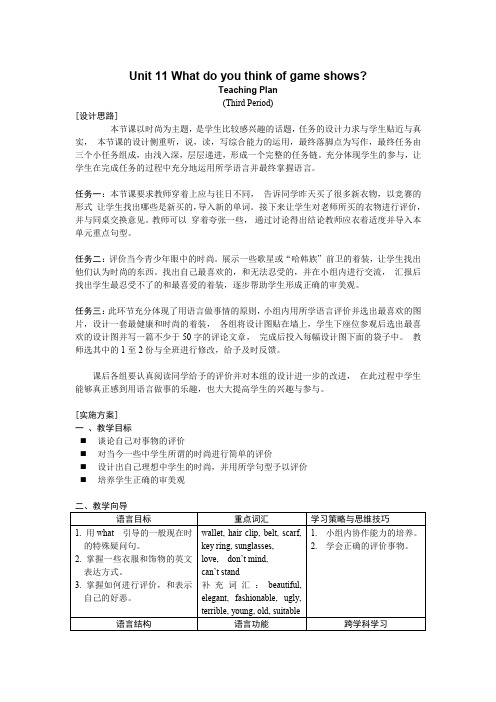
Unit 11 What do you think of game shows?Teaching Plan(Third Period)[设计思路]本节课以时尚为主题,是学生比较感兴趣的话题,任务的设计力求与学生贴近与真实,本节课的设计侧重听,说,读,写综合能力的运用,最终落脚点为写作,最终任务由三个小任务组成,由浅入深,层层递进,形成一个完整的任务链。
充分体现学生的参与,让学生在完成任务的过程中充分地运用所学语言并最终掌握语言。
任务一:本节课要求教师穿着上应与往日不同,告诉同学昨天买了很多新衣物,以竞赛的形式让学生找出哪些是新买的,导入新的单词。
接下来让学生对老师所买的衣物进行评价,并与同桌交换意见。
教师可以穿着夸张一些,通过讨论得出结论教师应衣着适度并导入本单元重点句型。
任务二:评价当今青少年眼中的时尚。
展示一些歌星或“哈韩族”前卫的着装,让学生找出他们认为时尚的东西。
找出自己最喜欢的,和无法忍受的,并在小组内进行交流,汇报后找出学生最忍受不了的和最喜爱的着装,逐步帮助学生形成正确的审美观。
任务三:此环节充分体现了用语言做事情的原则,小组内用所学语言评价并选出最喜欢的图片,设计一套最健康和时尚的着装,各组将设计图贴在墙上,学生下座位参观后选出最喜欢的设计图并写一篇不少于50字的评论文章,完成后投入每幅设计图下面的袋子中。
教师选其中的1至2份与全班进行修改,给予及时反馈。
课后各组要认真阅读同学给予的评价并对本组的设计进一步的改进,在此过程中学生能够真正感到用语言做事的乐趣,也大大提高学生的兴趣与参与。
[实施方案]一、教学目标⏹谈论自己对事物的评价⏹对当今一些中学生所谓的时尚进行简单的评价⏹设计出自己理想中学生的时尚,并用所学句型予以评价⏹培养学生正确的审美观本节课流程图附录:Handout 3Handout 4: Some pictures provided to the students.。
TeachingPlanforUnit11Thesoundsoftheworld

Teaching Plan for Unit 11 The sounds of the world丽水中学任文东This unit mainly talks about different kinds of music with the title The sounds of the world.1. Teaching aims and demands类别课程标准要求掌握的项目话题 1) Talk about different kinds of music2) Discuss characteristics of different kinds of music and differences between them3) Write a comparison essay功能 Giving advice and making suggestionsYou’d better (not)…You should/ought to…You ne ed (to) …Shall we…?Let’s…What/How about…?Why not…?Why don’t you…?I think …I am sure (that)…Maybe you could…词汇 suggestion musical instrument perform performer blues characteristic slave jazz contain traditional spread variety universal folk guitar record satisfy inner desire emotion process musician totally express intelligence chantin common turn into语法 The passive voice in different tenses1) 一般现在时(am\is\are done)Our monitor keeps the key to the classroom.→The key to the classroom is kept by our monitor.2) 一般过去时(was\were done)Ricky Martin performed the song of the 1998 World Cup. →The song of the 1998 World Cup was performed by Ricky Martin.3) 现在进行时(am\is\are being done)Everyone in the country is singing the beautiful song. →The beautiful song is being sung by everyone in the country.4) 过去进行时(was\were being done)Smith was weighing the baby elephant. →The baby elephant was being weighed by Smith.5) 一般将来时(will be done)The famous band will give a performance in the Capital Concert Hall. →A performance will be given by the famous band in the Capital Concert Hall.6) 过去将来时(would be done)He knew that they would invite him to perform in the New Year’s Concert.→He knew that he would be invited to perform in the New Year’s Concert.7) 现在完成时(have\has been done)They have picked out the top ten pop songs →The top ten pop songs have been picked out.8) 过去完成时(had been done)The headmaster had given the boy a golden pen. →The boy had been given a golden pen by the headmaster.2. 教学内容分析本单元的中心话题是“音乐”。
(湘少版)五年级英语上册《Unit 11》教学设计设计

(湘少版)五年级英语上册《Unit 11》教学设计一、教学目标1.掌握新词汇和表达方式:some, any, always, usually, never等;2.能够听懂、会说、会读单词和句子,并能理解简单的语言表达;3.能够简单地运用所学句型和语言表达,并能够运用到实际生活中。
二、教学准备1.教师课件、黑板/白板和画笔;2.相关练习册和教材;3.大小班分组卡片。
三、教学过程1. 创设情境1.引入新单词和表达方式:some, any, always, usually, never等;2.通过课件展示图片或实物进行实践练习;3.通过口语训练,帮助学生运用所学语言表达。
2. 语言输入1.通过教材P26,教师可以通过相应的图片和实物向学生介绍所学单词和表达方式;2.通过教师的简单讲解和提问,帮助学生理解每个单词和句子的含义;3.适当的让学生复读所学单词和句子,以方便记忆。
3. 语言输出1.通过课堂互动,让学生自由运用所学语言表达;2.通过练习册等方式,帮助学生独立地进行练习;3.通过课堂作业,强化学生的语言输入和输出能力。
4. 课后作业1.复习所学的新单词和表达方式;2.练习所学习的句子和口语表达;3.准备下节课的相关教材。
四、教学方法1.学生中心的Teaching方法;2.以情境为切入点,制定相关课堂活动;3.以学生口语输出为重点,进行口语训练。
五、教学评估1.教师在课程中的点拨和指导;2.学生对教材后的理解;3.学生课堂练习和作业完成情况。
六、教学反思本节课采用了学生中心的Teaching方法,让学生在一个温馨、舒适的情境中,运用所学单词和表达方式进行口语输出。
从效果看,效果还是不错的,在课堂后的评估中,学生的出色表现得到了教师的高度评价。
不过,一些需要改进的地方,比如,更加细化的教案设计和强化学生口语输出能力的相关练习,还需要进一步加强。
总的来说,本节课仍然需要更好的实践和调整。
人教版九年级英语全册Unit11单元整体教学设计
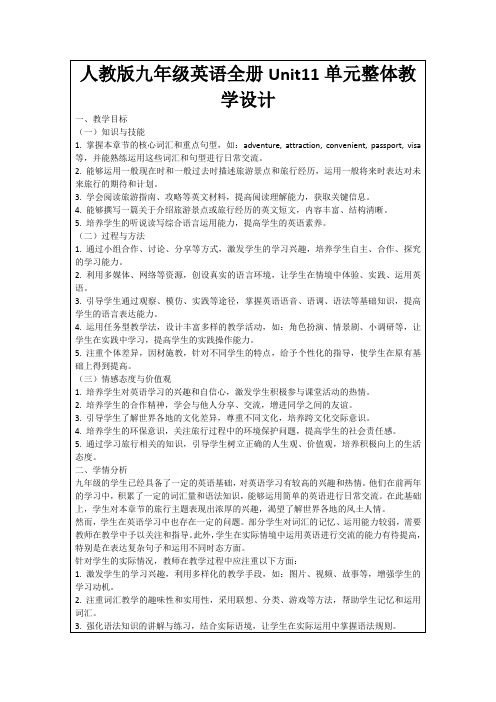
3.强化语法知识的讲解与练习,结合实际语境,让学生在实际运用中掌握语法规则。
4.针对学生个体差异,实施分层教学,关注每个学生的学习需求,提高他们的自信心和学习积极性。
5.创设丰富的语言环境,鼓励学生大胆开口,提高学生的听说能力和口语表达能力。
人教版九年级英语全册Unit11单元整体教学设计
一、教学目标
(一)知识与技能
1.掌握本章节的核心词汇和重点句型,如:adventure, attraction, convenient, passport, visa等,并能熟练运用这些词汇和句型进行日常交流。
2.能够运用一般现在时和一般过去时描述旅游景点和旅行经历,运用一般将来时表达对未来旅行的期待和计划。
四、教学内容与过程
(一)导入新课(500字)
1.教师通过展示一组世界各地旅游景点的图片,引导学生观察并询问:“Where have you been? Where would you like to go?”,让学生分享自己的旅行经历和梦想。
2.学生分享后,教师引入本节课的主题:“Today, we are going to learn about travels and adventures. We will talk about some famous attractions and our travel experiences.”
五、作业布置
为了巩固本节课所学知识,培养学生的自主学习能力和实际运用能力,特布置以下作业:
1.完成课后练习册的相关练习,巩固词汇和语法知识。
-选择题:检测学生对词汇和时态知识的掌握程度。
-填空题:培养学生运用所学词汇和句型进行填空的能力。
Unit11英语教材课后作业教案:巩固知识轻松搞定

Unit 11英语教材课后作业教案:巩固知识轻松搞定英语是国际交流必须使用的语言之一,也是学习的重要科目之一。
在学习英语课程的过程中,学生需要通过大量的阅读、听力、口语和写作练习来提高自己的语言技能。
同时,英语教师需要为学生提供一系列的课后作业,以加深学生对所学内容的理解和记忆,并帮助学生熟练掌握相关知识。
本文将以Unit 11英语教材课后作业教案为例,介绍如何帮助学生在课后巩固所学内容,轻松搞定课后作业。
一、课程教材简介Unit 11英语教材是指在英语学习的第十一个单元。
本单元的教学内容主要涉及运动与健康、饮食与健康、习惯与健康等方面的主题。
在本单元的课程学习中,学生需要掌握如下的语言知识:一、动词词组的用法。
二、形容词和副词的比较级与最高级。
三、身体部位和常见疾病等的表达。
四、简单的健康建议和健康习惯。
二、课后作业介绍在学习本单元课程内容后,学生需要完成一系列的课后作业,以巩固所学知识。
本单元的课后作业主要包括:1、单词练习:单选题、填空题、翻译练习等。
2、语法练习:选择填空、改错、短文填空、阅读理解等。
3、作文练习:根据提示写一篇关于健康的短文。
以上三种练习都需要学生具备一定的英语基础,才能完成和理解。
然而,许多学生在完成课后作业时,常常感到难以解决问题、不知道如何下手。
因此,我们可以采用下列的课后作业教案,来帮助学生更好地完成所在的作业。
三、课后作业教案1、单词练习单词是英语学习中的重要基础知识,对于课后单词练习,可以采用以下方法:(1)对课本中出现的难词进行筛选。
选择一些学生不太熟悉或想学习的单词列入练习内容。
(2)根据阶段性的练习目标进行分组。
如单选题、填空题、翻译练习等,不同的阶段可以选择不同的练习方法。
(3)加强记忆曲线。
合理安排每个单元的单词练习,使学生的记忆不易遗忘,更好地巩固所学知识。
2、语法练习语法练习是英语学习中重要的环节。
教师可以采用以下方法:(1)阅读理解练习。
选择实际上的文本,将语法知识贴近学生的生活,让学生在真实的语境中理解语法知识。
英语教案-新教材高一教案UNIT11(第2课时)
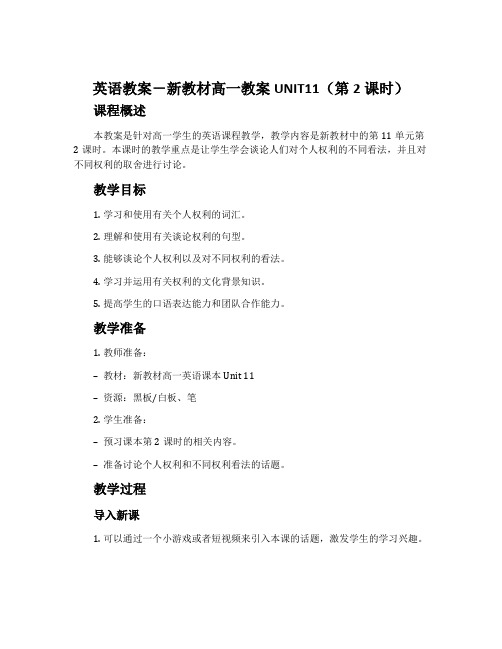
英语教案-新教材高一教案UNIT11(第2课时)
课程概述
本教案是针对高一学生的英语课程教学,教学内容是新教材中的第11单元第2课时。
本课时的教学重点是让学生学会谈论人们对个人权利的不同看法,并且对不同权利的取舍进行讨论。
教学目标
1.学习和使用有关个人权利的词汇。
2.理解和使用有关谈论权利的句型。
3.能够谈论个人权利以及对不同权利的看法。
4.学习并运用有关权利的文化背景知识。
5.提高学生的口语表达能力和团队合作能力。
教学准备
1.教师准备:
–教材:新教材高一英语课本Unit 11
–资源:黑板/白板、笔
2.学生准备:
–预习课本第2课时的相关内容。
–准备讨论个人权利和不同权利看法的话题。
教学过程
导入新课
1.可以通过一个小游戏或者短视频来引入本课的话题,激发学生的学习兴趣。
词汇学习
1.教师给学生提供一份包含有关个人权利的词汇表,要求学生念出并记住这些词汇。
例如:freedom, equality, privacy, justice, etc.
句型学习
1.教师引导学生学习一些谈论权利的句型,例如:
–。
六年级英语Unit11教学计划
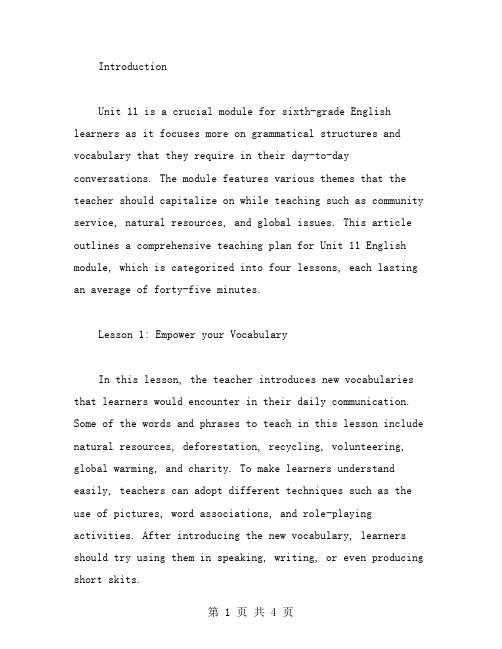
IntroductionUnit 11 is a crucial module for sixth-grade English learners as it focuses more on grammatical structures and vocabulary that they require in their day-to-day conversations. The module features various themes that the teacher should capitalize on while teaching such as community service, natural resources, and global issues. This article outlines a comprehensive teaching plan for Unit 11 English module, which is categorized into four lessons, each lasting an average of forty-five minutes.Lesson 1: Empower your VocabularyIn this lesson, the teacher introduces new vocabularies that learners would encounter in their daily communication. Some of the words and phrases to teach in this lesson include natural resources, deforestation, recycling, volunteering, global warming, and charity. To make learners understand easily, teachers can adopt different techniques such as the use of pictures, word associations, and role-playing activities. After introducing the new vocabulary, learners should try using them in speaking, writing, or even producing short skits.Lesson 2: Global IssuesIn the second lesson, the teacher should set the stage for discussing global issues such as air pollution, water pollution, and climate change. The teacher can present a short video clip that depicts the different effects of global warming or use a storytelling approach. After the presentation, the teacher should bring out the theme of global issues clearly and ask students to discuss the problem and create relevant solutions. The teacher can guide discussions by posing questions that require learners tothink critically about the impact of global problems on their lives.Lesson 3: Community ServiceThe third lesson should focus on community service, in which the teacher should emphasize the importance of giving back to the society. To achieve this goal, the teacher can invite a guest speaker who is actively involved in community service. The guest speaker could share his or her experience, challenges, and how he/she has benefited from the exercise. After the speaker's talk, the teacher should lead adiscussion about community service, its benefits, and the various ways in which learners can get involved. The teacher can also discuss how learners can start their community service projects in their localities.Lesson 4: Natural ResourcesIn the final lesson, the teacher should discuss natural resources and their conservation. The teacher can start by introducing learners to the various natural resources and their significance to human life. The teacher can then discuss the concept of conservation and their importance in preserving natural resources for future generations. The teacher can invite a biologist or environmentalist to talk about the importance of conserving natural resources, sharing examples of agriculture, forestry, and fishing. After the talk, learners should discuss the conservation strategiesthat they can apply in their daily lives.ConclusionUnit 11 in the sixth-grade English module is an essential section, contributing to the development of learners' language skills. The four lessons, Empower your Vocabulary,Global Issues, Community Service, and Natural Resources, accentuate the pressing issues that learners can relate to and engage them through discussions, group work, guest speakers, and videos. The lessons draw attention to social responsibility, critical thinking, and conservation efforts, allowing learners to learn through interactive activities. The teaching plan outlined above will enable teachers to achieve their teaching objectives and help English learners to develop their language skills.。
Unit 11 unit11 what do you think of game showTeaching plan
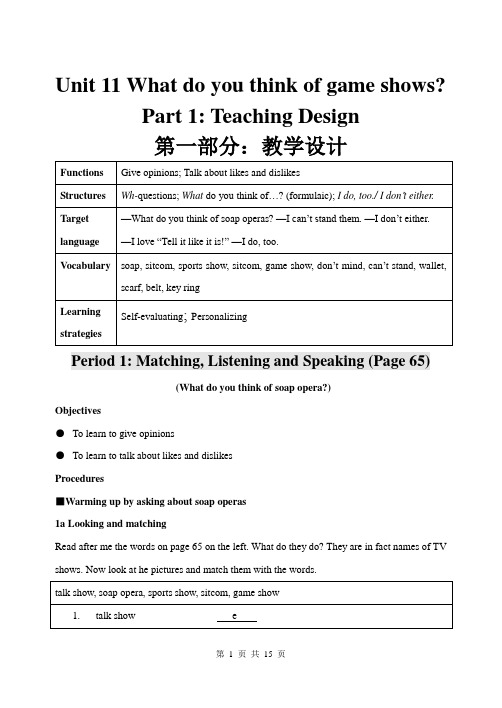
Unit 11 What do you think of game shows?Part 1: Teaching Design第一部分:教学设计Period 1: Matching, Listening and Speaking (Page 65)(What do you think of soap opera?)Objectives●To learn to give opinions●To learn to talk about likes and dislikesProcedures■Warming up by asking about soap operas1a Looking and matchingRead after me the words on page 65 on the left. What do they do? They are in fact names of TV shows. Now look at he pictures and match them with the words.1b ListeningJack and Mark are talking about TV shows. List en to the tape and try to find out “What does Mark say about TV shows?”Listen again and write a letter a—e from activity 1a.Now go to page 88 to read this conversation. While reading try to find all the “What do you think of…?”sentences. A lso cut/ the sentence into thought groups, study all the predicates, circle all the linking words and underline all the express ions. That’s grammar study, indeed.Now read the conversation again to turn it into a text.1c Pairing and speakingSomeone likes watching TV. They think TV shows are very interesting. But their favorite programs are different. Let’s practice the co nversation below.Then make your own conversations to express your opinion.Period 2: Listening, Matching and Speaking (Page 66)(Why do you like P.E.?)Objectives●To learn to use Wh-questions●To learn to use What do you think of…?Procedures■Warming up by studying the grammar focusHi! Let’s go to page 66. Let’s ask and answer questions as in the grammar focus.Now let’s ask and answer as they do in the grammar focus.2a Listening and numberingHere is a conversation about the program being shown. Listen and number the expressions1—5 as you hear them. The answers should be:2b Listening and fillingListen to the conversation again and fill in the blanks with the words you hear.Now let’s talk as they do in the conversation. We are going to talk in imitation of the conversations we have just heard and read.2c Pairing and speakingLet’s practice the conversation in 2b in pairs and make you own conve rsations about anything you like.Period 3: Completing, Speaking and Speaking (Page 67)(What do you think of Sports News?)Objectives●To learn to use What do you think of…?●To learn to use I do, too./ I don’t either.Procedures■Warming up by asking and answeringHi, everyone! Good morning. What’s this in English?What color is it? What’s his name? Where’s he from? Do you like him? How much are his pants? When is his birthday? Do you want to go to a movie starred by him? Can you find his films online? What time do you go to cinema? My favorite film is “I can’t stand girls with sunglasses.” I like the situation in the film. Why do you like your favorite film? I want to be an actor. What do you want to be? What do you think of actors and actresses?3a Pairing and speakingAsk and answer in pairs. Student A looks at this page. Student B looks at page 85. The questions can be: What do Yang Lin and Alan think of these CCTV show? Then fill in the blanks.3b Reading and fillingThe conversation below is an interview about Ala n’s favorite TV show. Use the information in activity 3a to fill in the blanks.4 SURVEYPlease look at the chart. It is a survey about TV shows. First fill in the blanks with what you think. Then find the students who agree with you.Period 4: Ordering, Speaking and Listening (Page 68)(What ’s up?)Objectives● To learn to give opinions● To learn to use I do, too./ I don’t either. P rocedures■Warming up by making a revisionLook at the things in my hand. What do you think of the watch? Do you like the dress? What about the pencil case? What about the color of the key ring? Do you love the belt? What do you think of the wallet, the scarf and the sunglasses? Let ’s go to page 68 to look and match. 1a Looking and matchingLook at these pictures and words. You should read them correctly after me. Then try to match these things with the words.1b Looking and speakingHow many of these things do you have? Tell the class what you think of them. Work in pairs, ask and answer about the six pictures. For example:2a Listening and writingListen to the tape and fill in the table what Marie, Carol and Paul are talking about.Let’s check the answers. Please write the words correctly.2b Listening and fillingListen to the tape again. This time please write down what Carol and Paul think about each thing. Fill in the chart in 2a with the following words: loves, likes, doesn't mind, doesn't like, can't stand.Now go to page 88 to read the tape scripts. While reading underline all the expressions and copy them in your notebook. .Now read the conversation again to turn it into a text.2c GROUPWORKIt’s your turn to ask and answer questions about what your parentsthink of the things in 1a. Maybe they have different ideas.Period 5: Reading, Filling and Surveying (Page 69)(What’s cool?)Objectives●To learn to talk about likes and dislikes●To learn to use What do you think of…?Procedures■Warming up by reading aloud the textHi, class. Look at this photo. What are they doing in the photo? This man is painting a picture. This woman is speaking to the boy. The boy is cleaning the floor. The girl is reading a story about a boy waiting for his mother day and night. His mother is shopping for him in town. Look at this dog in the corner. He is relaxing in the rain. It is raining. It doesn’t snow in this part of the country. The little girl is cooking while studying how to take a photo. She is cooking for herself. The cat is lying on the table. It looks at the girl cooking. The cat is having a goodtime. Could you describe the look of the cat for the class? Look at the people here in the photo. They are talking about the cat in order to improve their English. They are going to visit the United States. This man is to stay in the States for two years. He has to do some reading in English. He is practicing his reading. He spends time in reading in English. He doesn’t go shopping. He goes for a walk instead. He sits on a stone. He is writing to his son. He saw his son two years ago. His son had gone to the States. It is time to visit his son in the States. What about this woman? She is the man’s wife. She didn’t speak English. She thinks of her son often, too. She is crying. Thinking of her son makes her feel sad. She walked to the post office. She decided to send her son a letter. She discussed her worries with her husband. She can’t stand living without her son. She agrees to learn English. She agrees with her husband on going to the United States to see their son. How about your English learning? How good are you at your English? Let’s go to page 69 to read the text.3a Reading and fillingThis is an article from the school magazine. Now read this text. While reading try to cut/ the sentence into thought groups, study all the predicates, circle all the linking words and underline all the expressions. That’s grammar study, indeed.Read Maria's article again. Fill in names of the students in the chart on Page 87.Now read the text again to turn it into a conversation and act it out.3b Looking and fillingSince you have read Maria’s article, now look at activities on page 68. Try to fill in the blanks below to complete the letter to Maria.4. SURVEYPrepare a list of five more things. You can ask your classmates what they think of each thing.SELF CHECK1. Checking words you knowRead the words in Part 1 aloud and get to know the meanings of them. You should try to learn them by heart. Now please check the words you know.2. Writing down new wordsYou can write five or more new words in your notebook. Try to increase your vocabulary as much as possible.3. Reading and writingWhat can you see in the picture? Yes, it’s a talk show. Now please read what Rose Smith says in the picture. Then think about: “Do you agree with her?”Then talk about your own opinions in pairs about the idea that old people can't be beautiful. Use the words given below: can't stand, don’t' mind, don't like, love, like. Try to write your opinions on the paper. Whoever of you would like to read his opinion to the class?。
下unit11单元教学计划
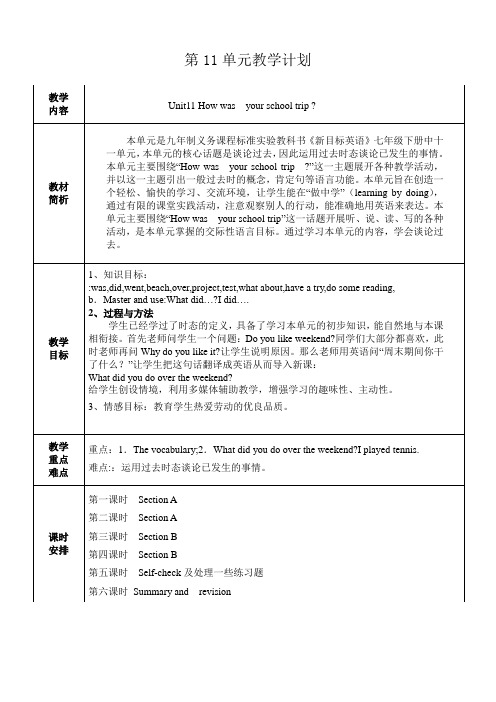
课时
安排
第一课时Section A
第二课时Section A
第三课时Section B
第四课时Section B
第五课时Self-check及处理一些练习题
第六课时Summary and revision
教学
目标
1、知识目标:
:was,did,went,beach,over,project,test,what about,have a try,do some reading,
b.Master and use:What did…?I did….
2、过程与方法
学生已经学过了时态的定义,具备了学习本单元的初步知识,能自然地与本课相衔接。首先老师问学生一个问题:Do you like weekend?同学们大部分都喜欢,此时老师再问Why do you like it?让学生说明原因。那么老师用英语问“周末期间你干了什么?”让学生把这句话翻译成英语从而导入新课:
第11单元教学计划
教学
内容
Unit11 How was your school trip ?
教材
简析
本单元是九年制义务课程标准实验教科书《新目标英语》七年级下册中十一单元,本单元的核心话题是谈论过去,因此运用过去时态谈论已发生的事情。本单元主要围绕“Howwas your school trip?”这一主题展开各种教学活动,并以这一主题引出一般过去时的概念,肯定句等语言功能。本单元旨在创造一个轻松、愉快的学习、交流环境,让学生能在“做中学”(learning by doing),通过有限的课堂实践活动,注意观察别人的行动,能准确地用英语来表达。本单元主要围绕“How was your school trip”这一话题开展听、说、读、写的各种活动,是本单元掌握的交际性语言目标。通过学习本单元的内容,学会谈论过去。
七下英语11单元讲课教案
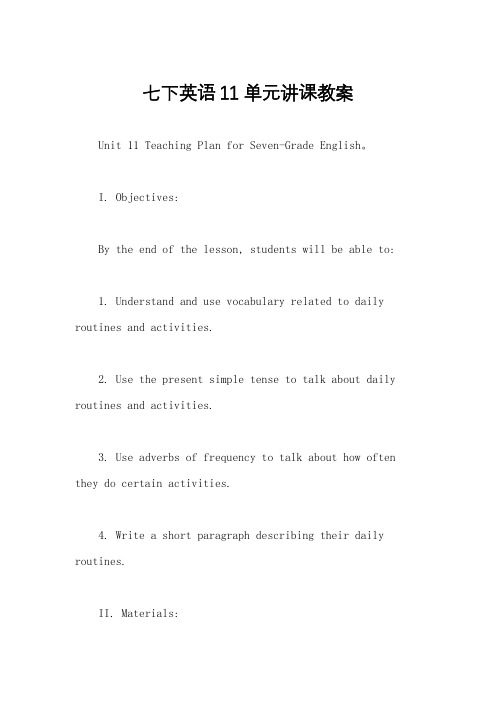
七下英语11单元讲课教案Unit 11 Teaching Plan for Seven-Grade English。
I. Objectives:By the end of the lesson, students will be able to:1. Understand and use vocabulary related to daily routines and activities.2. Use the present simple tense to talk about daily routines and activities.3. Use adverbs of frequency to talk about how often they do certain activities.4. Write a short paragraph describing their daily routines.II. Materials:1. Textbook: Seven-Grade English, Unit 11。
2. Whiteboard and markers。
3. Handouts with exercises and activities。
4. Pictures and flashcards related to daily routines and activities。
III. Procedures:1. Warm-up (10 minutes)。
Greet the students and ask them about their daily routines. Encourage them to use the vocabulary and grammar they have learned so far.Show pictures and flashcards related to daily routines and ask students to identify the activities and describe their own routines using the present simple tense and adverbs of frequency.2. Presentation (15 minutes)。
人教版七年级英语下册Unit11教学设计
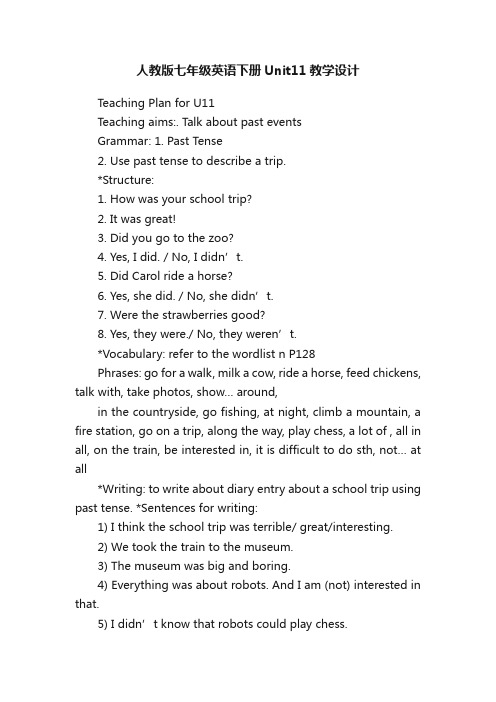
人教版七年级英语下册Unit11教学设计Teaching Plan for U11Teaching aims:. Talk about past eventsGrammar: 1. Past Tense2. Use past tense to describe a trip.*Structure:1. How was your school trip?2. It was great!3. Did you go to the zoo?4. Yes, I did. / No, I didn’t.5. Did Carol ride a horse?6. Yes, she did. / No, she didn’t.7. Were the strawberries good?8. Yes, they were./ No, they weren’t.*Vocabulary: refer to the wordlist n P128Phrases: go for a walk, milk a cow, ride a horse, feed chickens, talk with, take photos, show… around,in the countryside, go fishing, at night, climb a mountain, a fire station, go on a trip, along the way, play chess, a lot of , all in all, on the train, be inter ested in, it is difficult to do sth, not… at all*Writing: to write about diary entry about a school trip using past tense. *Sentences for writing:1) I think the school trip was terrible/ great/interesting.2) We took the train to the museum.3) The museum was big and boring.4) Everything was about robots. And I am (not) interested in that.5) I didn’t know that robots could play chess.6) I learned a lot/ nothing about robots.7) I liked the trip very much./ I don’t like it at all.Use the following words to write a paragraph (at least 80 words):trip, interested, take, visit, really*Passage to recite: P62 2dTeaching procedures:II. Form:Period 2-3: Section ATeaching material: section A1.Lead in : the life in the countrysideQ1: Did you go on a trip in the countryside?Q2:What did people do when they worked on a farm?T: We are going to go on a trip in the countryside in two weeks. Let’s expect what you will do there.2.T: Carol went on a school trip on a farm. Let’s see whatshe did.1a Match the phrases with the picture.Pay attention to the past tense (irregular):Go---went; ride---rode; feed--- fed; take---took3. 1b Listen and circle the three things Carol did on her school trip in 1a.Pair Work: 1cA: Did Carol take any photos?B: Yes, she did.4. Listening and Oral practice.a) 2a Listen and check the questions you hear.b) 2b Listen again and circle T for true or F for false.c) Pair-work. Ask and answer about Carol’s visit to the farm.A: What did Carol do?B: She picked some strawberries.A: Did she learn a lot about farming?B: Yes, she did. / No, she didn’t.( The teacher can give the target language)e.g. What/Carol/ do?What /farmer/ grow?Farmer/ grow/ apples?d) Key Points:1. show sb. around 带领某人参观,My friend showed me around the zoo.2.learn a lot about 学会很多关于…3.grow apples种植苹果grow strawberries/cropsplant trees 种树plant侧重种植动作,grow侧重培育的过程花草:grow/plant树木:plant农作物:grow4.pick v. 摘pick up 捡,拾,接NotesFarms: In the US, many children will never have visited a farm. This is especially true if they are from a large city. Although city farms are becoming more common, they usually just have a few animals such as chickens and pigs. There are many different types of farms across the US.e.g. dairy farms where cows produce milkgrain farms where crops such as wheat are grown to make breadfruit and vegetable farms where fruit such as apples and oranges are grown.5.2d Conversationa)Listen to the conversation and answer the following questions:1.Where did Eric go last weekend?2.Why did he go there?3.What did he do?4.How was the weather there?5.What did he do at night?6.How did Eric feel about the trip?b)Listen and read along with the tapeKey Points:1.countryside n. 农村,乡下country n. 国家;农村in the country = in the countrysidecountry 可用作形容词,country 则不行e.g. country music/ road2. go fishinggo doing: go fishing; go boating; go shopping; go skating…3.so much fun 太好玩了e.g. Look, Peter. The children are having so much fun.4. lucky you= you are luckyLucky me/him!c) Role- play the conversation of 2d and recite 2d.6.Grammar FocusHave students read the sentences. Pay attention to the past tense.Review the regular verbs and irregular verbs.More irregular verbs refer to P1417. 3a. Complete Jim;s letter on th e left and Bill’s r eply on the right.8. Chain Story 3ba) Have students work in groups. Make up a story. Each student adds a sentences.b) The group finishes the story in the shortest time wins.S1: Last week I visited my aunt’s house.S2: The weather was beautiful.S3: We went fishingS4: …8. Homework.a) Copy the sentences from Grammar Focus.b) Recite 2d.Period 4-5 Section BTeaching material: Section BTeaching procedures1. Review by checking recitation of 2d2. Lead in.T: Beside the countryside, we may also go to other places for our school trip.1a. Match the activities with the pictures.3. 1b. Listen and answer the question.1c. Listen again. What did Jane and Tony do on their last school trip. Check Tony or Jane.4.Pair work.What was your last school trip like? Discuss with your partner and make conversations A: How was your last school trip?B: We went to ...A: That sounds good. What did you do?B: I … What about you?A: I ...5. 2a. Find the words to describe the good things and the words to describe the bad things.6. Reading.a) Read Helen’s and Jim’s diary entries and answer the questions.1. Did Helen and Jim go on the same trip?2. How do they feel about the trip.b) Read again and complete the chart.Key points:* along the way沿路* play chess with sb.* teach v.teach sb. sth.teach sb. to do sth.teach sb. how to do sth.E.g. Mr. Brown teaches us math.He taught her to draw pictures.The robots teach them how to play chess.* take photos* buy... fore.g. I buy some lovely presents for my parents.*all in all 总的来说Similar phrases: in a word, in short, anyhowE.g. All in all, it was an interesting movie.* slow train 慢车* be interested inI am really interested in the trip.*It was difficult (for me) to take photosIt was +adj.+ for sb. + to doIt was important for you to follow the rules.* not... at all 一点也不I don’t like the museum at all.He didn’t know the news at all.She is not at all good at soccer.c)Group work: InterviewHave three students work in a group. They act as Interviewer, Helen and Jim. Make up dialogues.Suggested Questions: Where did you go?How did you to there? Is it good?What did you do there?What do you think of the trip?7. Writing.a) 3a. Look at the three pictures and write down phrases about the pictures.take a bus, take photos, buy giftsRead Bob’s diary entry and complete it a ccording to the pictures.b) 3b Linda is Bob’s classmate. She has completely different opinion about the trip. Complete herdiary entry.c) 3c How to write a diary entry? (The teacher can tell the students to read the four diary entries in2b, 3a, 3c and draw a conclusion)A diary entry may include following parts.Q: What was the date?Where did you go?How was the trip?How did you go there?What did you see?Did you like it?/ Did you have a good time?d) Write a diary entry about your school trip8. Self Check9. Homework.a) Write a diary entry about your school trip.b) Prepare for a quiz.。
- 1、下载文档前请自行甄别文档内容的完整性,平台不提供额外的编辑、内容补充、找答案等附加服务。
- 2、"仅部分预览"的文档,不可在线预览部分如存在完整性等问题,可反馈申请退款(可完整预览的文档不适用该条件!)。
- 3、如文档侵犯您的权益,请联系客服反馈,我们会尽快为您处理(人工客服工作时间:9:00-18:30)。
Unit 11: Could you please tell me where therestrooms are?Part 1: Teaching Design第一部分:教学设计Period 1: Matching, Listening and Speaking (Page 86)(Could you tell me where I can buy some stamps?) Objectives●To learn to understand and use indirect questions●To listen and speak about how to ask for information politelyProcedures■Warming up by studying the title “Could you please tell me where the restrooms are?”Hello everyone. I am a strange here in this city. Could you tell me how to get to the supermarket? All right, I am telling a lie to you. I am not new here. I said so just to help you learn to use the indirect questions.Now turn to page 87 first and look at the three sentences in the Grammar Focus.Have you noticed the word “where” and “how” used in the sentences. The questions introduced by them are called the indirect questions.Now in pairs make similar sentences with “where” and “how”.1a Looking and matchingOn page 86 is a picture of a city. A visitor is asking someone questions about things to do at certain places. Now look at the picture and match each thing with a place.1b Listening and completingIt is difficult to get around in a new place. Now listen to the recording and complete the dialogue in the picture on page 86. Write your words here in the speech bubbles.Now go to page 134 to read the tapescript.While reading try to find all the sentences used to ask for information politely, cut/ the sentence into thought groups, study all the predicates, circle all the linking words and underlineall the expressions. That’s grammar study, indeed.Now try to make a conversation like the one you read just now.1c Pairing and speakingIn 1a there are many phrases describing activities. Now use them to make up conversations to talk about your own city. (The Indirect questions are darkened.)Period 2: Listening and Speaking (Page 87) (Can you tell me where I can buy some shampoo?) Objectives●To learn to understand and use indirect questions●To listen and speak about how to ask for information politelyProcedures■Warming up by studying the “Target Language”Hello, class. Go to page V first. Read after me the sentences in Target Language.—Excuse me. Do you know where I can exchange money?—Sure. There’s bank on the second floor. Take the escalator to the second floor and turn right. The bank is next to the bookstore.2a Listening and numberingDo you like shopping? If you do,come and listen to the directions for going shopping around a new city.While listening please number the directions in the order that you hear them.Now go to page 134 and read the tapescript. While reading try to find all the indirect questions, cut/ the sentence into thought groups, study all the predicates, circle all the linking words and underline all the expressions. That’s grammar study, too.2b Listening and drawingDo you like drawing?Now listen to the recording again to draw a line on the picture on page 87 to show how the boy walks to the drugstore.2c Pairing and speakingWhat else do you like to buy? Then make conversations in pairs using the other places in the picture on page 87.Period 3: Reading, Speaking and Writing (Page 88)(They’re all at the mall.)Objectives●To learn to understand and use indirect questions●To read, speak and write asking for information politelyProcedures■Warming up by learning to use “mall” to make sentencesHello, class. Do you know what a mall is?It is a business center, usually including restaurants and a convenient parking area. It is a modern version of the traditional marketplace.Now let’s make sentences with “mall”.3a Reading and listingOn page 88 is an article about going to a mall. Now read it to list the advantages and disadvantages of going to a mall. While reading try to cut/ the sentence into thought groups, study all the predicates, circle all the linking words and underline all the expressions. That’s grammar study, in deed.Copy all the expressions in your notebook.3b Grouping and speakingWhere do you usually hang out with friends? What are the advantages and disadvantages of hanging out at your house, at a mall or at your school? Now in groups talk about them.4. Thinking and writingNow we are going to challenge one another. Write directions from your school to three certain places. Read the directions to each other and guess the places.Unit 11 Could you please tell me where the restrooms ar e?Section BObjectives●T o describle some places with adjectives●tolearn to understand and use indirect questions●To write, listen and speak asking for information politelyProcedures■Warming up by looking at some pictures1a Reading and orderinginteresting fascinating inexpensive delicious uncrowdedbig beautiful safe clean convenientFirs t:Look at the words and make sentencesSecon d:Make new conversationsOn page 89 is a list of words and a box with places. Now go over them and put in words beside the place, the most important quality words first.1b Pairing and speakingYou are familiar with the words in 1a. Now use them to talk about your city.2a Listening and writingSome tourists are going around your city. They are asking about things. Now listen to them talking and write what they ask about.Do you know what the tourists are asking about?2b Listening and writingNow you are to listen to the conversations for the second time. Listen for where the man saysthe tourists should go.EXERCISE S:To look at the screen and do them SUMMAR Y:To learn to understand and use indirect question To speak asking for information politely HOMEWOR K:To make new conversations like 2c on page 89教学设计三河中学马云霞Period 5: Reading, Writing and Speaking (Page 90) (Eat, have fun and learn in Watertown!)3b Reading and completingOn page 90 is an unfinished tour guide to Sunville. Now turn back to 2a and 2b for information to finish it.3c Write a guide to your city or townMY HOMETOWN: TAIYUANTaiyuan, the capital city of Shanxi Province, lies in the north part of Middle Jin and crosses the River Fen. The city area has three parts, one smaller city and five counties. The history of the city can go back to over 2,400 years ago. It was set up in 497 BC, the end of the Spring and AutumnPeriod and was named Jinyang, the northern bank of the Jin River. In Chinese, the northern bank of waters is called yang. In 982, Song Taizong, Zhao Kuangyi, the second emperor of the Song Dynasty burned and flooded Jinyuan City. After that, he ordered one of the officials, Pan Mei to build Taiyuan City in Tangming Town, north of Jinyuan City. Thus, came the present Taiyuan City. Taiyuan, in Chinese, means the greatest plain. In fact, around it there are many high mountains and hilly areas. Only one-fifth of the whole area is plains. Taiyuan has coal and iron, so it has the name, "the home of coal and iron." Taiyuan is nice in climate. It is not dry and cold in winter, not hot and rainy in summer, not dusty and windy in spring. But it is cool and comfortable in autumn.4 Grouping and speakingOne of the group members is to role play the information booth worker, and the others are the tourists. The tourists are asking about your city.。
